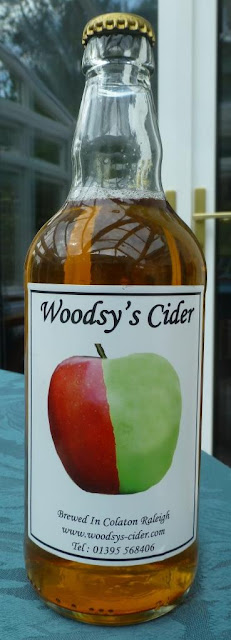Cider-making heritage under threat
Trevor Waddington: “We’re talking about the survival of small cider producers who don't want their
industry to become history.”
Fairlynch Museum’s Chairman
Trevor Waddington has added his voice to the protest movement led by Britain’s
small cider-makers whose livelihood is threatened by EU bureaucracy.
Since 1976, cider-makers who produce
fewer than 12,000 pints a year have not had to pay duty. Earlier this year the
European Commission demanded that
Britain end the tax relief which has allowed many small producers to flourish,
and which has encouraged the revival of a traditional craft particularly strong
in the West Country.
The National Association of Cider
Makers believes that such small producers make up 80% of Britain’s 480
cider-makers, and that four out of five could be put out of business if the EU
tax demand is met.
“If you
enjoy the occasional glass of English cider you may well feel like giving your
support to what is an important part of our heritage,” says Trevor, who is
urging friends to sign a petition currently being publicised by MEP Ashley Fox.
“We’re talking about the survival of small cider producers who don't want their
industry to become history.”
A traditional cider press
Cider-making is a centuries-old tradition in the Lower Otter Valley, which is the area covered by
Fairlynch, from Budleigh Salterton to Newton Poppleford and Harpford. Otter
Valley Association researcher Anne Speight records in an
Ovapedia article how local farmers visited several orchards where they blessed
the apple trees. A hogshead of cider was
provided and guns were fired at the trees after singing the following verse :
Here's to the manure which dresses the trees,
Here's to the tree which bears the bud,
Here's to the tree which bears the bud,
Here's to the bud which bears the fruit,
Here's to the fruit which makes the drink,
And here's
success to all.
Threats to the livelihood of cider-makers aroused much discontent in the
West Country. Researcher Roz Hickman,
who is also a volunteer steward at the Museum, quotes this entry in The Public
Ledger dated 17 July 1766 in another OVA article:
“On
Monday last, great rejoicing was made at Otterton in the county of Devon, by
the direction of John Duke Esq. for the repeal of the late Cyder Act. The day
was begun with beat of drum, music playing and bells ringing. A procession was
made by a great number of the inhabitants, of the said parish, both men and
women, through that place and the neighbouring villages, all arranged in due
order, attended with a drum beating, several sorts of music, flags displayed
and all of them decorated with handsome favours etc etc. too long to mention,
which made a grand appearance. A bullock was roasted and distributed amongst
the people with vast quantities of bread and plenty of liquor. The evening was concluded with a bonfire,
illuminations and drinking the health of the King, Queen and Royal family and
afterwards all those patriotic gentlemen who exerted themselves in obtaining a
repeal of that Act which imposed a burden so grievous to be borne by those
cyder counties. Joy was visible in every
countenance and was expressed by the loud acclamations of a vast concourse of
people, assembled together from that and the adjacent parishes, on this happy
occasion.”
The
Cider Act, explains Roz, was one of the taxes raised by the government of
George III in 1762. “Britain was heavily
in debt at the end of the Seven Years’ War and imposing this new tax of 4/- per
hogshead of cider was just one of several measures taken.
That
the act was unpopular is an understatement; the MPs representing the cider-producing
counties of England, tried unsuccessfully to prevent the bill becoming
law. One cause of its unpopularity was
that the tax was to be collected by the Excise Service, who were hated in the
West Country; the excise men would have
to visit and investigate every apple-grower in the area, tenant and landowner
alike, and the number of government agents would have had to increase
enormously for the tax to be collected.”
Farm workers received meagre wages and were paid partly in cider, a practice
that continued well into the late 1800s. “Usually cider so sour one could
hardly drink it,” notes Roz.
Today’s
ciders are a considerable improvement on such drinks, but the traditional
techniques for processing apple juice remain the same.
A good
example of the revival of cider-making is in Colaton Raleigh, a few miles north
of Budleigh Salterton. You can’t fail to
see the signs as you drive through on the Exmouth-Sidmouth Road, where Jerry
Woods and his family sell their Woodsys Cider at the village shop which
they opened in 2008.

The
striking logo on the banners outside is based on the unusually marked red and green apple grown by
Colaton Raleigh man Ken Morrish and presented to Jerry.
“It all started when I had a go at making perry,” explains Jerry. “From there I went on to cider and then came the moment when we had to decide whether to invest money in equipment to process apple juice on a large scale.”
The
decision to invest has paid off. Woodsys Cider won 1st prize for its
Sunrise Medium Cider at the Devon County Show this year.

I’ve sampled quite a few West Country ciders and can tell you that the judges were absolutely right: this particular cider is delicious.

These vats contain fruit ciders; I liked the elderflower variety
The family now produces a range of ciders including fruit drinks ranging from strawberry to blackcurrant. But the cider apple remains the staple of the cider-making industry. “Every farm had its cider barn,” says Jerry. “You can still see the old cider presses in many properties round here.”

I’ve sampled quite a few West Country ciders and can tell you that the judges were absolutely right: this particular cider is delicious.

These vats contain fruit ciders; I liked the elderflower variety
The family now produces a range of ciders including fruit drinks ranging from strawberry to blackcurrant. But the cider apple remains the staple of the cider-making industry. “Every farm had its cider barn,” says Jerry. “You can still see the old cider presses in many properties round here.”

Jerry with his prize-winning cider. The 1,000-litre metal vats behind him are made by the German firm Speidel, which has been manufacturing high quality tanks for the wine and beverage industries for over 100 years. They represent a significant investment: each one costs £2,000
“We’re proud to be part of a great West Country tradition,” he tells visitors who call at the shop for a tasting. “We are now producing our own take on many different blends of cider and as natural as we can get it. Every year experimenting on something different and something new!”
Woodsys Cider is at http://www.woodsys-cider.com
To sign the petition, click on http://www.ciderduty.com/
PS. Don't underestimate the strength of some ciders. Remember what happened to poor Hugo, the medieval saltworker I wrote about here







Comments
Post a Comment